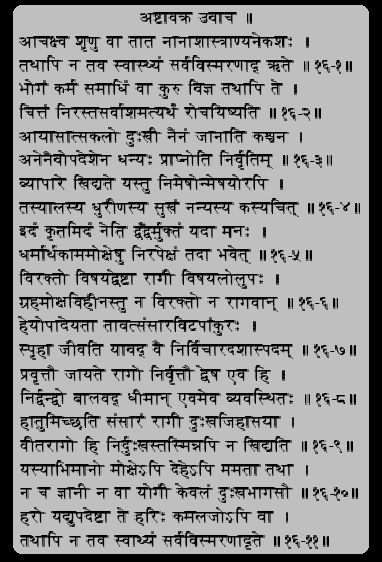



Ashtavakra said:
My son, you
may recite or listen to countless scriptures, but you will
not be established within until you can forget everything. 16.1
You may, as
a learned man, indulge in wealth, activity, and meditation,
but your mind will still long for that which is the cessation of desire,
and beyond all goals. 16.2
Everyone is
in pain because of their striving to achieve something, but
noone realises it. By no more than this instruction, the fortunate
one attains tranquillity. 16.3
Happiness
belongs to noone but that supremely lazy man for whom even
opening and closing his eyes is a bother. 16.4
When the
mind is freed from such pairs of opposites as, "I have
done this, " and "I have not done that," it becomes indifferent to merit,
wealth, sensuality and liberation. 16.5
One man is
abstemious and averse to the senses, another is greedy
and attached to them, but he who is free from both taking and
rejecting is neither abstemious nor greedy. 16.6
So long as
desire, the state of lack of discrimination, remains, the
sense of revulsion and attraction will remain, which is the root
and branch of samsara. 16.7
Desire
springs from usage, and aversion from abstension, but the
wise man is free from the pairs of opposites like a child,
and becomes established. 16.8
The
passionate man wants to eliminate samsara so as to avoid pain,
but the dispassionate man is free from pain and feels no
distress even in it. 16.9
He who is
proud about even liberation or his own body,
and feels them his own, is neither a seer nor a yogi. He is still
ust a sufferer.16.10
If even
Shiva, Vishnu, or the lotus-born Brahma were
your instructor, until you have forgotten everything you
cannot be established within. 16.11
[Translation by John Richards]